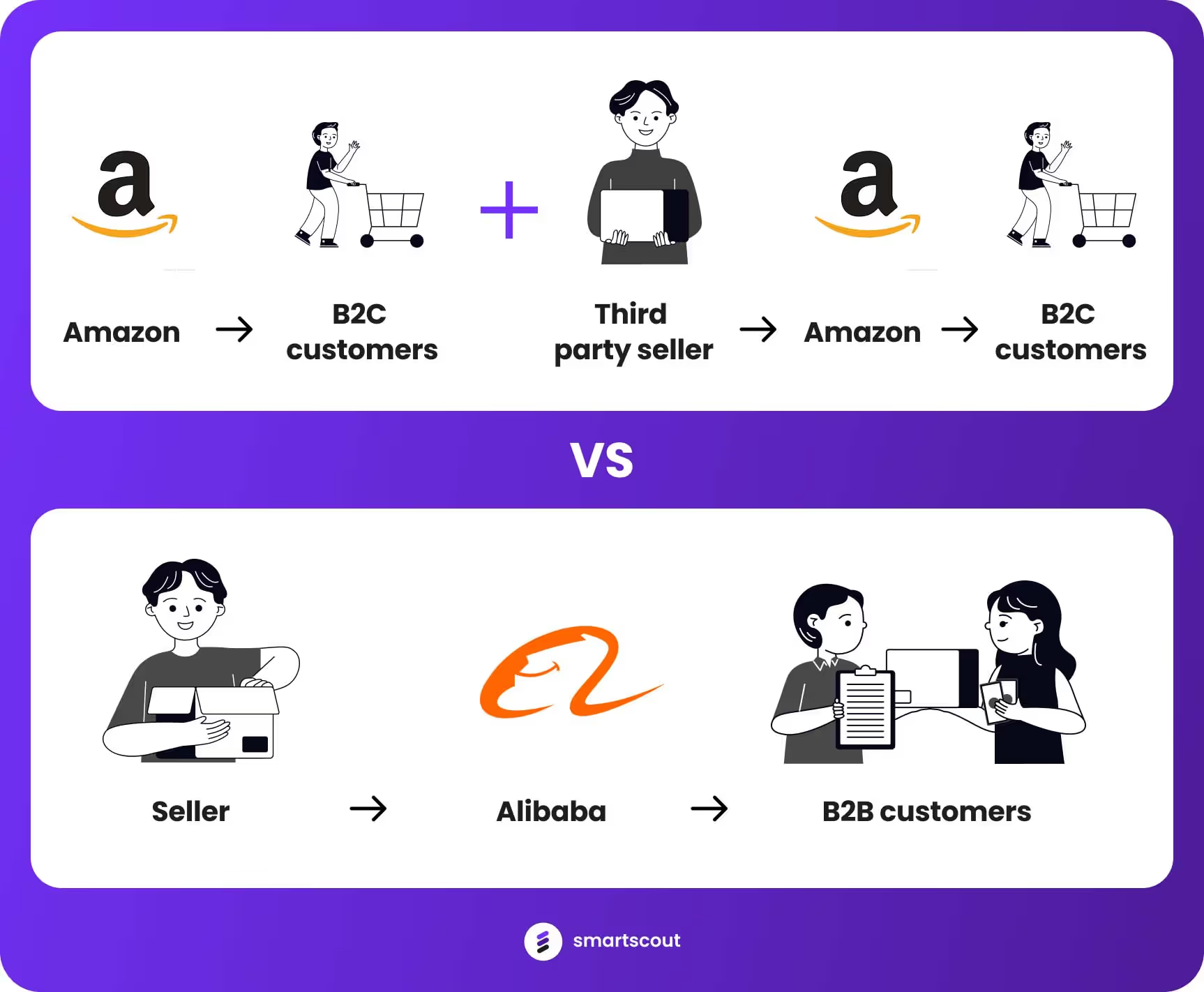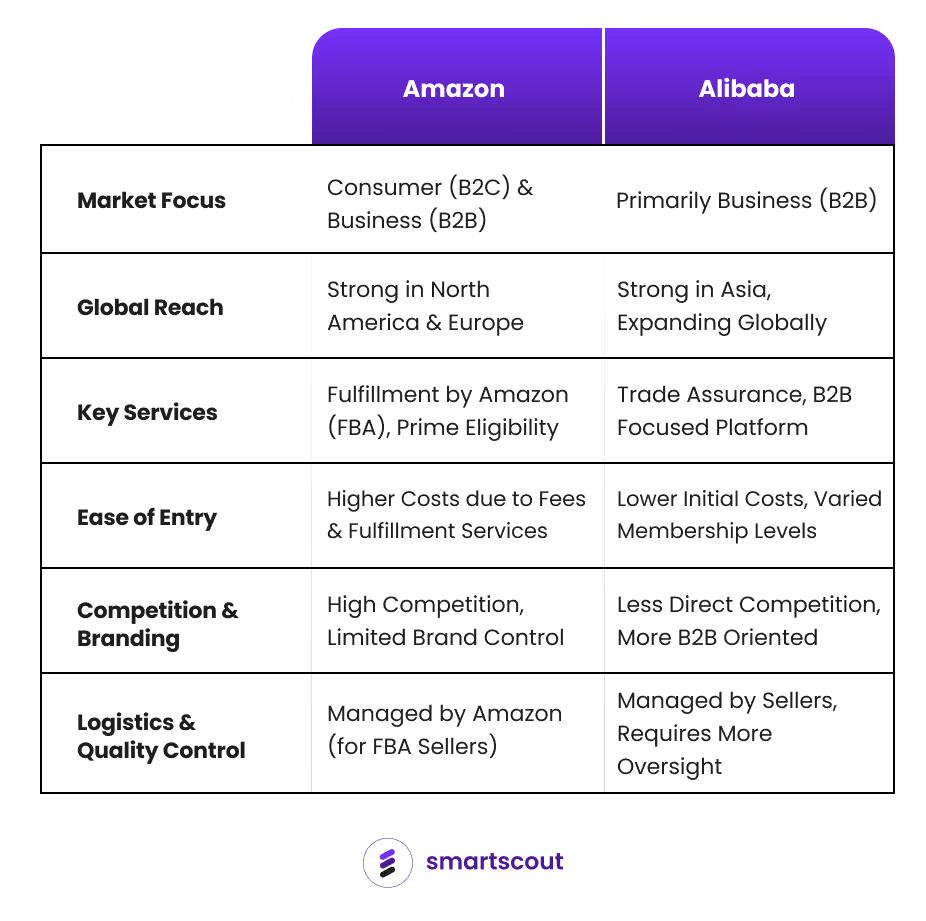What is the main difference between Amazon and Alibaba? The better question might be: why sell on Amazon over Alibaba?
To sell to consumers worldwide, especially in North America and Europe.
Amazon and Alibaba are both big names in online selling, but they work in different ways. Amazon gets more involved in selling products directly. It handles a lot of the steps in selling, such as storing products and shipping them. On the other hand, Alibaba acts more like a middleman. It connects sellers with buyers but don't get involved in storing or shipping products.
This key difference really shapes how they do business:
- Amazon tries to manage every part of selling, from start to finish.
- Alibaba helps sellers and buyers connect and do business together, but it doesn't handle the products itself.

Amazon and Alibaba have different ways of doing business, and this affects how much you need to invest and what you can expect.
Amazon's way of working means you need to put more money into things such as storage spaces, moving goods around, and keeping track of inventory. This can be costly, but it also lets Amazon make sure everything is of good quality and customers are happy. This focus on quality and service has helped make Amazon a trusted name.
Alibaba, however, takes a lighter approach. It doesn't need to worry about storing and managing physical products. This makes it easier for Alibaba to grow quickly. It focuses on connecting sellers with buyers. Alibaba relies on these sellers doing well, as that's how it makes money. It's really big in the wholesale market and is a go-to place for smaller and medium-sized businesses that want to buy products, especially from places such as China and other parts of Asia.
Market Orientation: B2C vs. B2B
Amazon primarily operates as a Business-to-Consumer (B2C) platform. It's designed for retailers to sell directly to the end consumer. This model is evident in the way Amazon has structured its services, from Prime delivery to customer service.
Alibaba, conversely, started as a Business-to-Business (B2B) marketplace. It's tailored for manufacturers and wholesalers to connect with retailers or other businesses. This difference is crucial for sellers to understand when choosing a platform based on who their target customers are.
Revenue Streams: Direct Sales vs. Service Fees
Amazon generates a significant portion of its revenue from direct sales, where it acts as the retailer. It also earns through subscription services such as Amazon Prime, seller fees from third-party merchants, and AWS.
Alibaba's revenue comes mainly from service fees, including advertising and premium memberships for sellers on its platforms. It does not engage in direct sales, which means it doesn't compete with its sellers.
Geographical Focus: Global vs. China-centric
While both platforms are international, Amazon has a more global presence with dedicated websites for numerous countries and a vast logistics network that supports international shipping.
Alibaba, while also international, has a more significant focus on China, the world's largest manufacturing hub. It caters extensively to the Chinese domestic market and helps international businesses source products from Chinese manufacturers.
Inventory Management: Stock vs. No Stock
Amazon stocks products in its vast network of warehouses, taking on the risks and responsibilities of inventory management. This allows for quick shipping and a controlled quality assurance process.
Alibaba holds no inventory. It connects buyers with sellers who manage their stock, reducing Alibaba's operational risks and investments in physical infrastructure.
Seller Relationship: Competition vs. Partnership
On Amazon, third-party sellers are in direct competition with Amazon's own products. This can be challenging for sellers who might find themselves competing against the platform they're using to reach customers.
Alibaba positions itself as a partner to sellers, providing a marketplace to connect with buyers without selling any products of its own. This creates a less competitive and more collaborative environment for sellers.
Customer Interaction: Direct vs. Indirect
Amazon has a direct relationship with its customers, providing customer service and handling returns. This direct interaction builds customer trust and loyalty but also requires Amazon to manage a comprehensive customer service operation.
Alibaba's platforms, especially Alibaba.com, facilitate transactions but typically do not handle customer service for sales, which falls to the individual sellers. This indirect model can reduce overhead for Alibaba but places more responsibility on the sellers.
Pros and Cons: A Side-by-Side Comparison

Pros of Selling on Amazon
- Huge customer base: Amazon gives you access to millions of customers worldwide. This means your products can be seen and bought by a lot of people.
- Fulfillment by Amazon (FBA): With FBA, Amazon takes care of storing, packing, and shipping your products. This is great if you don't have your own system for doing these things.
- Prime eligibility: If Amazon fulfills your products, you can be part of Prime. This often leads to more sales because customers trust and like the Prime service.
- Customer trust: Amazon is known for good customer service. When you sell there, customers might trust you more just because you're on Amazon.
- Wide range of products: You can sell all sorts of things on Amazon, from books to electronics and more.
Cons of Selling on Amazon
- Lots of competition: There are so many sellers on Amazon that it can be hard to make your products stand out. You might also face price competition.
- Fees: Selling on Amazon comes with various fees, like referral and FBA fees. These can reduce how much money you make.
- Strict rules: Amazon has tough rules for sellers. If you don't follow them, you could be suspended from selling.
- Less brand control: On Amazon, you don't have much control over your brand or how you connect with customers. Amazon focuses more on the customer than on the seller's brand.
- Risk of counterfeits: There's a chance that other sellers might sell fake versions of your products, which can hurt your business's reputation.
Pros of Selling on Alibaba
- B2B focus: Alibaba is designed for business-to-business (B2B) sales. It's perfect for manufacturers and wholesalers who want to sell products in large quantities.
- Global reach: Alibaba is big in Asia, but it also connects sellers with buyers from all over the world, expanding your potential market.
- No competition with the platform: Alibaba doesn’t sell products itself, so you won't be competing against the platform, unlike on Amazon.
- Lower entry cost: Starting to sell on Alibaba can be more affordable. It offers different membership levels and generally has fewer initial fees than Amazon.
- Trade assurance: This service protects payments, giving both sellers and buyers more security when starting new business relationships.
Cons of Selling on Alibaba
- Complex logistics: As a seller, you have to handle your own shipping and logistics. This can be tricky, especially with large, international orders.
- Longer sales cycles: Selling B2B usually means longer waiting times for sales to go through. This requires more patience and sometimes more money upfront.
- Communication challenges: When you're dealing with buyers from different countries, language and cultural differences can make communication and negotiations harder.
- Quality control: It's up to you to make sure your products are good quality. This can be tough without direct control over how they're made and shipped.
- Payment risks: Even though Trade Assurance helps, there are still risks like payment fraud or not getting paid, especially in international trade.
Which is Better, Amazon or Alibaba?
After going through their differences, it's clear that each platform has its own advantages. Your decision really depends on what you need for your business.
If you want to sell directly to customers, especially in places such as the United States and Europe, and you're okay with handling inventory and logistics, Amazon is probably your best bet. It's great for businesses focused on customer service and building a consumer brand.
But, if you're more into wholesale, or if you're a smaller business looking to buy products without worrying about storing them, Alibaba could be the way to go. It's particularly useful if you're looking to connect with suppliers in Asia.
In the end, both Amazon and Alibaba can help your business grow, but in different ways. Think about what you want to achieve, what kind of customers you're targeting, and how you want to handle things like inventory. Your answers to these questions will help you decide whether Amazon or Alibaba is the better fit for your business.











